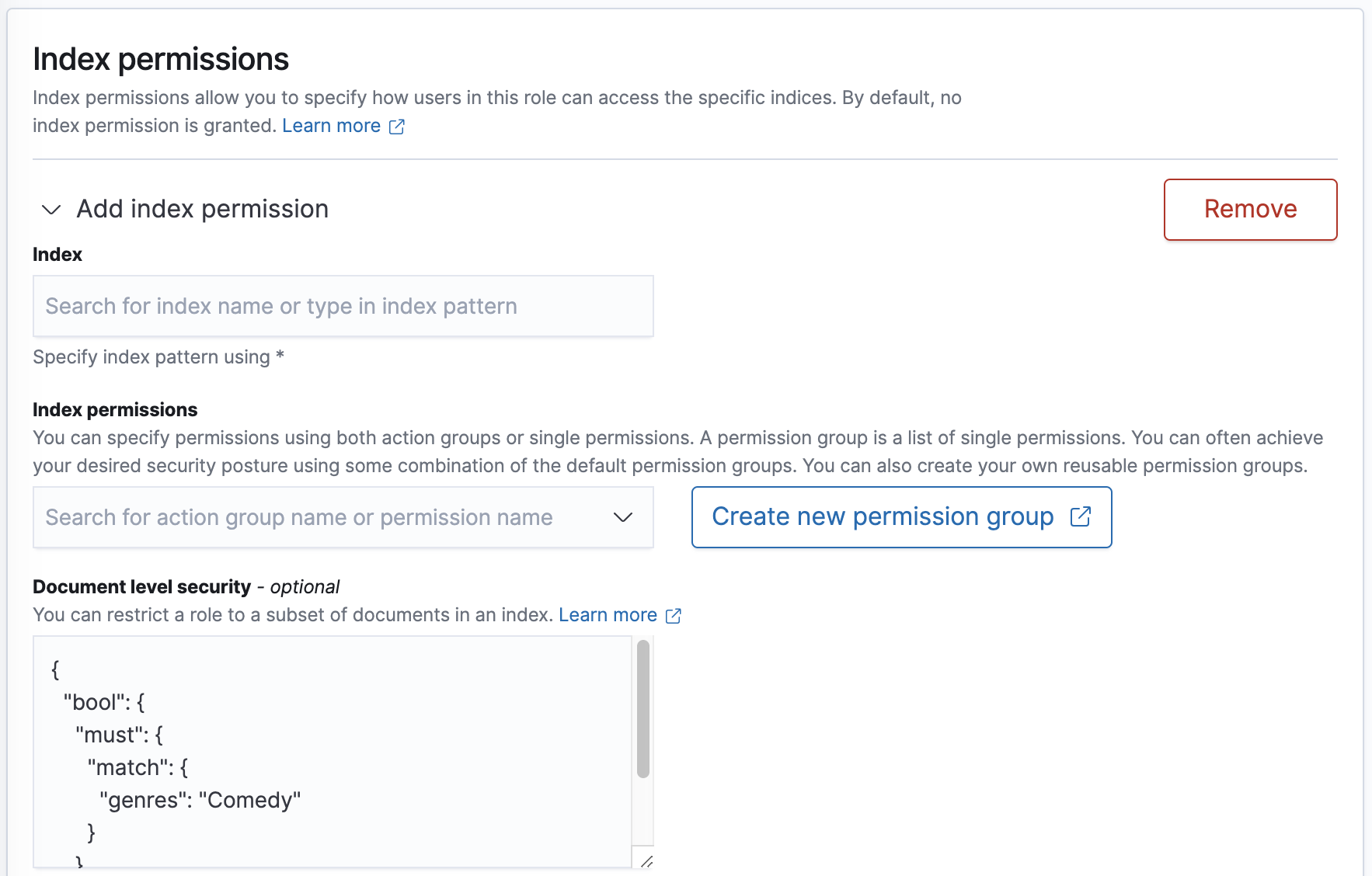The Open Distro project is archived. Open Distro development has moved to OpenSearch. The Open Distro plugins will continue to work with legacy versions of Elasticsearch OSS, but we recommend upgrading to OpenSearch to take advantage of the latest features and improvements.
Document-level security
Document-level security lets you restrict a role to a subset of documents in an index. The easiest way to get started with document- and field-level security is open Kibana and choose Security. Then choose Roles, create a new role, and review the Index permissions section.

Simple roles
Document-level security uses the Elasticsearch query DSL to define which documents a role grants access to. In Kibana, choose an index pattern and provide a query in the Document level security section:
{
"bool": {
"must": {
"match": {
"genres": "Comedy"
}
}
}
}
This query specifies that for the role to have access to a document, its genres field must include Comedy.
A typical request to the _search API includes { "query": { ... } } around the query, but in this case, you only need to specify the query itself.
In the REST API, you provide the query as a string, so you must escape your quotes. This role allows a user to read any document in any index with the field public set to true:
PUT _opendistro/_security/api/roles/public_data
{
"cluster_permissions": [
"*"
],
"index_permissions": [{
"index_patterns": [
"pub*"
],
"dls": "{\"term\": { \"public\": true}}",
"allowed_actions": [
"read"
]
}]
}
These queries can be as complex as you want, but we recommend keeping them simple to minimize the performance impact that the document-level security feature has on the cluster.
Parameter substitution
A number of variables exist that you can use to enforce rules based on the properties of a user. For example, ${user.name} is replaced with the name of the current user.
This rule allows a user to read any document where the username is a value of the readable_by field:
PUT _opendistro/_security/api/roles/user_data
{
"cluster_permissions": [
"*"
],
"index_permissions": [{
"index_patterns": [
"pub*"
],
"dls": "{\"term\": { \"readable_by\": \"${user.name}\"}}",
"allowed_actions": [
"read"
]
}]
}
This table lists substitutions.
| Term | Replaced with |
|---|---|
${user.name} | Username. |
${user.roles} | A comma-separated, quoted list of user roles. |
${attr.<TYPE>.<NAME>} | An attribute with name <NAME> defined for a user. <TYPE> is internal, jwt, proxy or ldap |
Attribute-based security
You can use roles and parameter substitution with the terms_set query to enable attribute-based security.
Note that the
security_attributesof the index need to be of typekeyword.
User definition
PUT _opendistro/_security/api/internalusers/user1
{
"password": "asdf",
"backend_roles": ["abac"],
"attributes": {
"permissions": "\"att1\", \"att2\", \"att3\""
}
}
Role definition
PUT _opendistro/_security/api/roles/abac
{
"index_permissions": [{
"index_patterns": [
"*"
],
"dls": "{\"terms_set\": {\"security_attributes\": {\"terms\": [${attr.internal.permissions}], \"minimum_should_match_script\": {\"source\": \"doc['security_attributes'].length\"}}}}",
"allowed_actions": [
"read"
]
}]
}